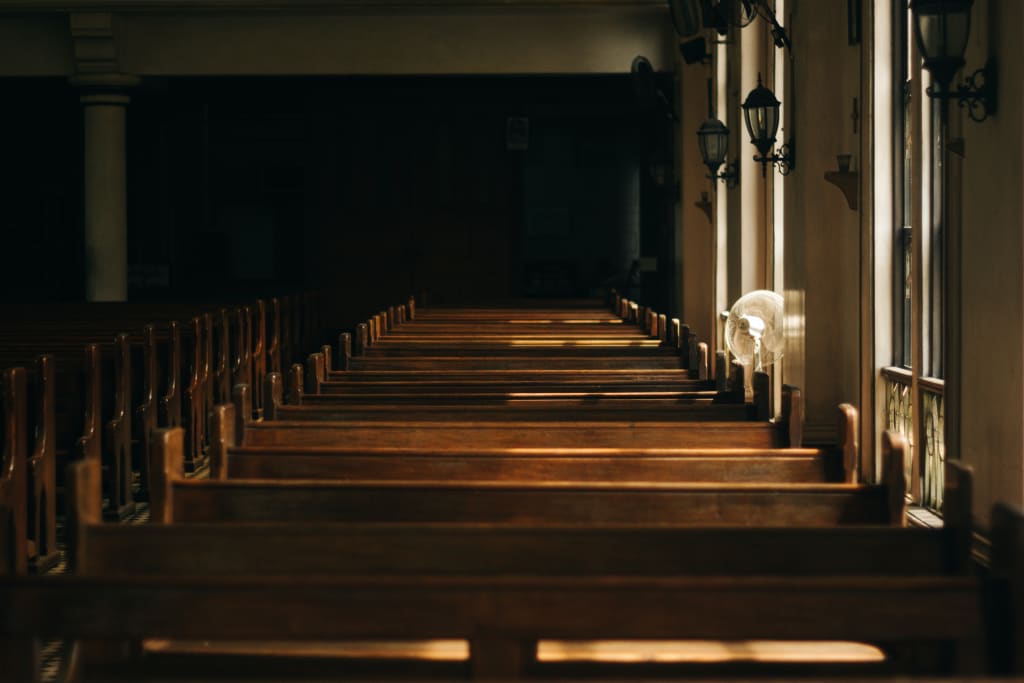Defining Legalism and Discovering God
How and why I left the fundamentalist cult I was raised in.

Here’s a very abridged list of things I was taught and believed an individual could not do and be a Christian when I entered college at 19:
- Wear shorts
- Date
- Kiss before marriage
- Listen to “rock” music (this includes rock, hip hop, pop, r&b, etc. – basically any secular music made in any contemporary style, as well as Christian contemporary music)
- Watch movies with language, sexual content, etc., in them
- Use any form of birth control
- Have tattoos
- Have long hair (this rule was for men)
- Have short hair (this rule was for women)
- Dance
- Read a version of the Bible other than the KJV
- Drink alcohol
- Read/watch Harry Potter
- Be a mother while having a job outside of the home
From the time I was two years old until I was in my early twenties, I was raised in and attended an Independent Fundamental Baptist (IFB) church. It’s likely, especially if you live in the south, that you’ve seen an IFB family or individual in public (it’s also likely that you thought they were Pentecostal). To a casual observer, these people are just oddballs. Cheery families, often with a lot of kids, with every girl wearing a loose skirt falling below her knees and every boy wearing a shirt neatly tucked into a pair of belted jeans, his hair trimmed high above his ears and collar. You will never catch any of these people at a concert, few of them will ever set foot in a movie theater, and most of them will never date, moving straight from their single years into a brief “courtship” period and then straight into marriage.
For a while I was willing to brush off the way I was raised as just odd or unconventional – not harmful. We didn’t seem to be hurting anyone, we weren’t picketing pride parades, we didn’t live in communes, and we weren’t waiting for a spaceship to take us to paradise; but as time has passed since I left Fundamentalism, my view on the harm the teachings can cause has shifted. In 2016, after a nearly decade-long battle with depression and anxiety, I made the choice to begin seeing a professional regarding my mental health and began to realize the long-term effects of the things I had been taught my entire life. I began to understand that the way I had been raised was not just unconventional, but dangerous – and that it had taken a huge toll on my mental health, self-worth, and my relationship with God.
This isn’t the first time I’ve written about the way I grew up; but it is the first time I’ve had the bravery to share it publicly. I’ve recently been introduced to a community of former IFB members, and hearing their stories and telling my own has been a monumental experience for me. Fundamentalism is a religion rooted in fear, oppression, and shame, and it’s done immeasurable damage to its members for decades. I can’t in good conscience be silent anymore.
Please know, my intent isn’t to call anyone out. I have no desire to ruin any lives, shame anyone, or make fun of the people still in the IFB. I’ve been hurt by this religion, and I don’t want to be the cause of hurt for anyone in it. My hope is that anyone who’s questioning the Fundamentalist religion, anyone who has been in it and is hurting as a result, or anyone who thinks their choices are between God and the IFB will be able to find guidance, freedom, and understanding in these posts. With that in mind, I think it’s important to make the first post on this blog one that speaks to freedom – not to condemnation or trauma. No one person’s journey out of fundamentalism will be exactly like another’s, but I’d like to tell the story of mine – in the hopes that it will encourage someone else to take the first step in theirs.
Shortly before and during my first year of college, I found myself at a self-imposed spiritual crossroads. I was suddenly faced with more opportunities to “break the rules” than I had ever had in my life. I went on a few dates, started watching movies that weren’t rated PG or edited for content, drank alcohol, danced (badly), and bought my first pair of shorts, leaving them at my friend’s dorm so my parents wouldn’t ever see them. Every time I did things like these, I felt an internal struggle over the life I was living and the life I had been trained to live. I didn’t feel like I was just stepping out on my own, I felt like I was stepping away in a deliberate act of rebellion against God, my parents, and my church. I began feeling like a liar when I called myself a Christian. Christians don’t do these things, I would tell myself. Fake Christians do these things.
As a kid in the church, we were always very judgmental towards “fake Christians”. It wasn’t so much an outward thing that was preached about from pulpits or taught in Sunday school, but it was more something that was talked about socially among the church youth. Because of the reclusive nature of our lifestyle, we didn’t have a lot of personal interaction with Christians who weren’t fundamentalists, but we did come in contact with them as groups, since our church was located in the Bible belt. The attitude towards less legalistic Christians was a “you can’t sit with us” Mean Girls-esque superiority. It wasn’t pity for the plight of their souls; it was harsh, unashamed judgment. We were sure that teenage girls in jeans, shorts, sleeveless shirts, and swimsuits were ignoring what they knew to be right and purposely dressing in a way that they knew would tempt men to lust after them. We believed that more modern church’s uses of contemporary Christian music in worship services was a devious attempt to emulate sinful music that non-Christians produced while still being able to have a “Christian” label on it. We believed that couples who dated (instead of courting) and engaged in too much physical contact before marriage, like kissing or embracing, just didn’t care what God wanted and were giving into their own selfish lust. In non-Christians these behaviors were pitied – they didn’t claim to know God, and couldn’t know any better; but in people who professed Christianity these practices were a display of their deliberate dismissal of God and His law. The attitude toward them was one of contempt – and I can’t pretend that I didn’t take part in that attitude. I was there side-eyeing and sneering along with my peers. It was easy to be that way; we rarely spent time one-on-one with people who weren’t like us, so we rarely saw anything but what was on the outside – and that was all we thought we needed to see. We assumed that the outside accurately reflected the inside, and that our beliefs were the standards with which to measure the outside. To put it bluntly, if they didn’t follow our rules, we assumed they just weren’t Christians. We assumed they were claiming the name of God to make themselves look or feel good. We assumed they were going to Hell.
So when, in my freshman year of college, I found myself thinking that only “fake” Christians did the things I was doing, I got scared. Was I fake? Was I claiming God to make myself feel better? Was I going to Hell? The more freedom I experienced, the more the fear came; but with it came another, more pressing thought:
I don’t want to go back.
I had lived 19 years with my every move being watched, mandated, and shamed. I had lived 19 years walking a tightrope of rules and regulations that were easily broken and frequently amended. I had spent 19 years in long denim skirts, listening to secular music in secret, having to ask my dad’s permission before I bought earrings in case they were “too dangly”, and being called rebellious and disappointing when I questioned or tried to cross the boundaries. After nearly two decades, I was wearing jeans and putting on eyeliner and painting my nails and blaring music my fellow church members would faint at in the car – and no one was telling me I was a horrible person for doing those things. And then I would go home and pretend I was living like I always had. And after about a semester of living a kind of double life, the feeling was stronger:
I don’t want to go back.
After about a semester and a half, the feeling changed:
I can’t go back.
When that happened, I was terrified. If only true Christians followed the rules I had been raised with, then I had a choice: follow the rules, or abandon my faith. In my head, I kept trying to tell myself that the choice was easy. If God wanted that from me, then I didn’t want God anyway, right? So I tried to say “screw it” and just kick it as an atheist, but that didn’t work. Something in me wouldn’t accept it. Somewhere along the way, through all the guilt and shame, God – the real God – had gotten in. I knew I believed in Him. I knew I didn’t want to give Him up; but I didn’t think it was possible to keep God and lose my old religion.
In the last month of my freshman year, I was introduced to a small community of college-aged Christians on my campus. The group was a mostly student-led organization that held church and worship services, game nights, free lunches, etc., for other students. It was open to everyone, but there were seventy or so regulars that were at most of the events. They were what I would have called fake Christians shortly before this. They all dressed like any other student on campus, there were several dating couples who could be seen snuggling on the couches in the rec room, they listened to normal music, they danced, etc. But what struck me about them was their diversity. Baptists, Catholics, Methodists, non-denominational Christians, non-Christians who were just looking for a place to hang out – I even ran into a couple of people from my old fundamentalist church camps. And pretty much everyone got along. It wasn’t a garden of Eden, and there were still disagreements, but people weren’t constantly whispering behind each other’s backs because someone’s shorts were too short or someone else had been caught listening to Post Malone. What was even more amazing to me was that everywhere I looked, I saw people in love with Jesus. Girls in shorts devoting what little free time they had to serving in ministry. Guys with long hair reading the Bible like they were seeing it for the first time. I realized that a person could dance and speak the truth of God. And the LOVE. It was everywhere. It was like a contagion that infected every single person that walked through the doors, and I had never experienced it on that scale. It was a love that didn’t ask for conformity or perfection or compliance. It was the love of God that He was showing unconditionally through His church, and it was tangible.
The definition of legalism in theology is “dependence on moral law rather than on personal religious faith.” I learned that about halfway through my sophomore year. Near the end of my sophomore year, I left the church I had attended my entire life. I have never reconsidered that decision.
It’s been nearly five years since I walked out of the IFB for good. There are still a lot of things that I hold onto from there; shame, guilt, a lack of self-worth, fear of judgment. I’ve unpacked a lot of it since I left, but I find myself still running into roadblocks. I don’t know if I’ll ever fully heal from my time spent as a fundamentalist – 19 years can do a number on you – but the more I learn about God for myself and the more I experience life on the outside, the more I think it just may be possible to fully recover. There is freedom outside of the IFB. There is God outside of the IFB. There is love outside of the IFB. But we can’t find it until we take the first step out.
About the Creator
Alexandra Authement
Welcome! I've been writing as a hobby all my life and am interested in sharing my work with a wider audience. Here you'll find poetry, fiction, and short memoirs about my experience growing up in fundamentalist Christianity.






Comments
There are no comments for this story
Be the first to respond and start the conversation.